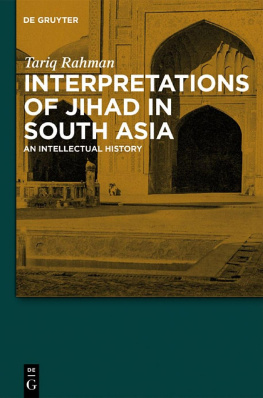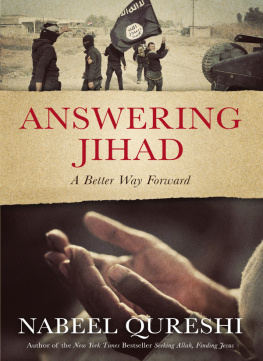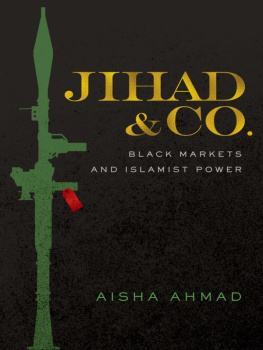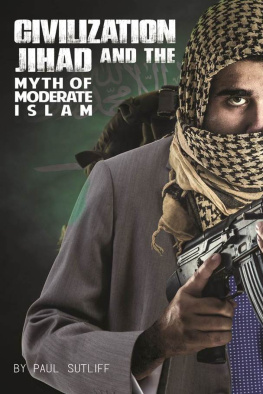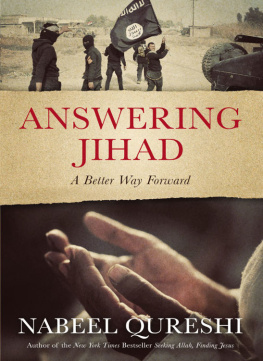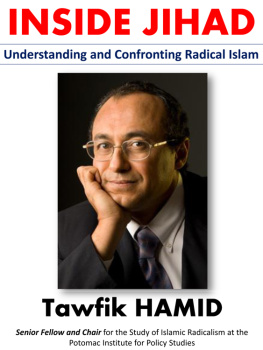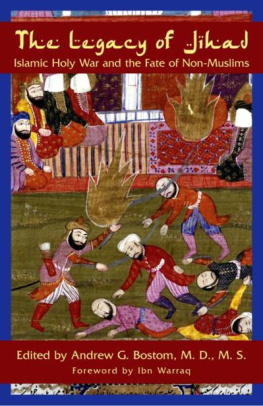Tariq Rahman
Interpretations of Jihad in South Asia
ISBN 978-3-11-055027-6
e-ISBN (PDF) 978-3-11-055201-0
e-ISBN (EPUB) 978-3-11-055035-1
Library of Congress Cataloging-in-Publication Data
Names: Rahman, Tariq, 1949- author.
Title: Interpretations of jihad in South Asia : an intellectual history / Tariq Rahman.
Description: Boston ; Berlin : De Gruyter, [2018] | Includes bibliographical references and index.
Identifiers: LCCN 2018023448 (print) | LCCN 2018025022 (ebook) | ISBN 9783110552010 (electronic Portable Document Format (pdf) | ISBN 9783110550276 (print : alk. paper) | ISBN 9783110550351 (e-book epub : alk. paper) | ISBN 9783110552010 (e-book pdf : alk. paper)
Subjects: LCSH: Jihad. | Islamic fundamentalism--South Asia.
Classification: LCC BP182 (ebook) | LCC BP182 .R337 2018 (print) | DDC 297.7/20954--dc23
LC record available at https://lccn.loc.gov/2018023448
Bibliographic information published by the Deutsche Nationalbibliothek
The Deutsche Nationalbibliothek lists this publication in the Deutsche Nationalbibliografie;
detailed bibliographic data are available on the Internet at http://dnb.dnb.de.
2018 Walter de Gruyter GmbH, Berlin/Boston
Cover image: Intrieur de la mosque Wazir Khan Lahore (valle du Pendjab, Pakistan), vers 1875, bpk / Coll. Grard Lvy / adoc-photos
www.degruyter.com
To the Bodleian and other libraries of the University of Oxford
where this book was researched
and my wife Hana who encouraged me to write it.
Contents
Preface and Acknowledgements
It was a hot and humid summer day in July 2007 and I was in Islamabad attending a seminar at a hotel. Soon after I left I heard the news that there had been an explosion on the very road I always travelled by. Fifty lay dead and at least a hundred, groaning with pain and covered with blood, desperately pleaded for beds in hospitals. The militants who claimed responsibility for it said it was in revenge for the attack on the Red Mosque (Lal Masjid) near the hotel. Then, in the same summer, my daughter Tania used the main Mall Road of Rawalpindi minutes before the Surgeon-General of the army was killed on it by a suicide bomber. Meanwhile ordinary Pakistani-Americanspeople who had thought themselves to be Americans earlierwere picked up as Moozlims (Muslims) and assaulted verbally in the United States of which I and my family had lovely, nostalgic memories from our stay on a senior Fulbright fellowship at the University of Texas at Austin and again as the first incumbent of the Pakistan chair at the University of California, Berkeley. Bad news was also coming from my daughters adopted country after marriage, the country she was born in, Britain. It was my own favourite country too since my student days in the eighties. What was happening to the world while I wrote on the history of languages? At last, in early 2014 I decided that I would use the historians tools to find out about Islamic militancy, i.e militancy using the name of Islam, in Pakistan.
But after reading the secondary sources I discovered that there was little I could say about it which had not been covered. The only original contribution I could think of was a profile of the militants but they were in military custody and access to them was impossible. Meanwhile, I had already written a research proposal and sent it to the Oxford Centre for Islamic Studies in November of that year. I did not expect it to be accepted for an award of a paid fellowship but, much to my surprise, it was. Now I would have to go but, instead of working on this book, I would work on an alternative history of Pakistan of which militancy would be a chapter. I told my wife Hana that we would have a holiday in Oxford this time since I had no serious plan of research.
This you have never done in all your life. You will find something which will keep you in the Bodleian like the last time.
The last time I was doing serious work. Trust me, it will be a holiday with some pleasure reading this time.
We will see. I bet the pleasure reading will lead to obsession like it always has.
We will see, I riposted.
In the spring of 2015 we went for a walk in one of Lahores lovely parks and Hana made me listen to a TEDTalk of a scholar who had studied some aspect of Islam by placing four translations of the Quran in front and reading every verse with its meanings. That gave me an ideawhy could I not do the same for the concept of jihad? I came home all atremble with excitement and so began a phase of intensive study of jihad. Luckily, just at that time, a lawyer with great interest in Persian and Arabic, Tausif ul Hasnain, volunteered to teach me Arabic. And so the hot gruelling summer of 2015 was spent in memorizing Arabic verb forms and reading the Quran and the hadith. Of course, Hana won the bet about Oxford. The Michaelmas term of 2015, in which we had Professor Barbara Harriss-Whites lovely house in Summer Town at our disposal, was spent in the Bodleian. So were the summers of 2016 and 2017 when I was a visiting fellow of Wolfson College, Oxford, thanks again to Barbara and Dr. Matthew McCartney, also a fellow of Wolfsons, who had recommended my name for the honour. In between I worked as hard as any diligent Ph.D. student to acquaint myself with a new subject. By the September of 2017, the first draft of the book was ready.
My debt is to so many people who made the book possible that it would be invidious to think that a few words of thanks will do. They will not but words are all I have, so let me begin. First, to my wife and companion Hana who encouraged me to write and continue writing when I was in despair because of some disturbing writings I had to read, and who never grudged me the money I needed for the research material and two trips to Oxford (2016 and 2017). These, after all, were years of financial constraints since our son, Fahad, was being supported by us financially in his studies at Oxford University.
Let me also thank other members of my family, my son-in-law Atif Kaudri (Tanias husband) and his family, who very generously offered me hospitality at their home in Chesham during our trips. Our 2017 stay is especially memorable since we stayed first in Wolfson College and enjoyed the therapeutic view of the pond and the geese waddling all over the lawns. And then we stayed in Atif and Tanias flat in Headington, Oxford, which was a rare pleasure. I also take this opportunity to thank our son Fahad Rahman not only for his patience in getting books scanned for me and lodging us in his room at Wolfson overlooking the lovely pond, but also encouraging me from time to time and giving laconic yet insightful comments about progressive Muslims. I would also like to thank my nephew Umair Jaffar for having helped me with the final editing. But for him the computers would have stumped me. I would also like to thank Yasser Khan, a doctoral student at Oxford, who helped me in making the index in July 2018.
I have mentioned Barbara above but I would like to thank her again for her various kindnesses: first, for giving us her house to live in; then for recommending me for fellowships and, above all, for unfailing courtesy and support throughout my work. I could hardly have benefited from the invaluable resources in the Bodleian but for the Islamic Centre and her. I also thank my friend, Dr. Chandramohan, who was always there to offer company and hospitality during all my visits.

